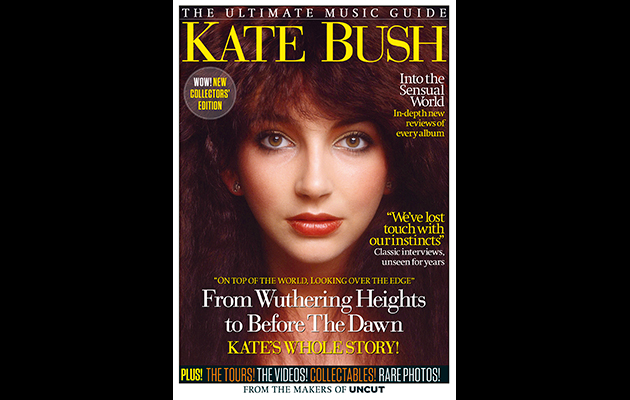As usual with these things, editing Uncut’s new Ultimate Music Guide: Kate Bush dug up a lot of strange, revealing old business from the NME and Melody Maker archives, not least an autumn 1980 piece which found an over-excited MM journalist in a Munich TV studio, watching Kate Bush put a double bass through its paces while she performed “Babooshka”.
Once the show – and the problematically ripe descriptions – were over, though, the interview with Bush is fascinating, as you can see if you pick up the Ultimate Music Guide (it’s on sale in UK stores on Thursday, but is already available here). Bush talks about wanting to tour again, about the books and films that have influenced her, about the permeable lines between confession and fiction.
“I rarely write purely personal songs from experience,” she says. “I worry about being too indulgent and giving too much away.” A little later, she is discussing the specifics of “Army Dreamers”, sung from the perspective of a mother mourning a son killed in action. “I seem to link on to mothers rather well,” she admits. “I find it fascinating about mothers, that there’s something in there, a kind of maternal passion which is there all the time, even when they’re talking about cheese sandwiches. Sometimes it can be very possessive, sometimes it’s very real.”
Even at her most elliptical, there is a clarity and consistency to Kate Bush which, looking back, seems a lot more obvious now than it might have done at the time. Latterly, for instance, the maternal fortitude implied in 1980 has become an explicit part of the most recent phase of her career, culminating in Before The Dawn – a theatrical spectacular inspired by her son Bertie McIntosh, and a showcase of his talents as a “very talented actor and beautiful singer,” as his mother wrote in her programme notes.
In the aftermath of Before The Dawn, it feels like the perfect time for us to consider, in depth, the whole story of Kate Bush. To that end, our latest Uncut Ultimate Music Guide features forensic new essays on every one of her albums, presented alongside a host of those long-unseen interviews. They show an artist who slowly gains the confidence to assert herself and – very slowly – gains the respect of the press. But also one whose idiosyncratic vision, and whose determination to bring that vision to fruition, has been there right from the start.
“There are always so many voices telling me what to do that you can’t listen to them,” she told another Melody Maker journalist in 1985, a genius on her own remarkable trajectory. “All I ever do is listen to the little voices inside me. I don’t want to disappoint the little voices that have been so good to me…”



